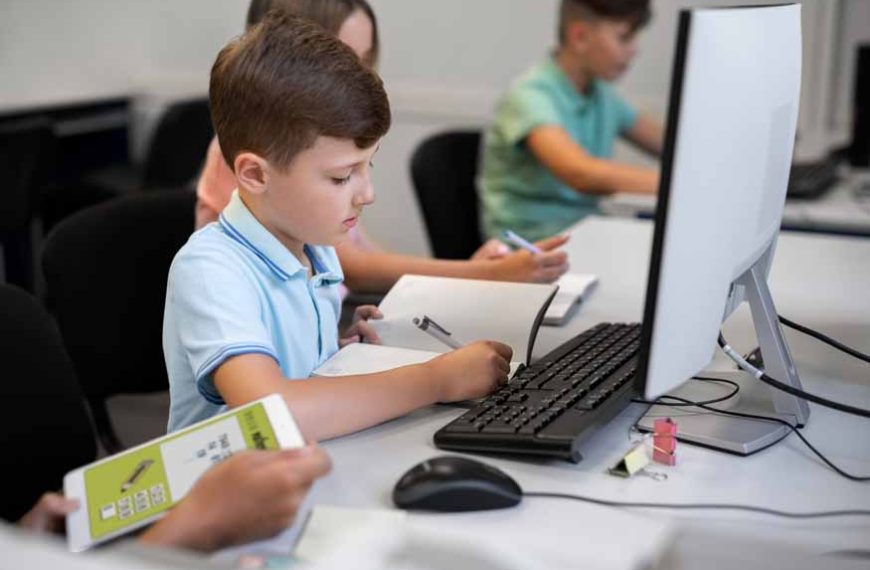In the contemporary landscape of our swiftly advancing digital age, the pervasive integration of computers into preschool education has evolved into a commonplace occurrence. This revolutionary change in educational paradigms forces us to critically and thoroughly investigate the complex effects—both positive and negative—that the ubiquitous use of computers may have on a child’s cognitive development during the vital early years.
Looking more closely at the subtle ways that these electronic gadgets influence preschoolers’ cognitive development is becoming more and more important as we find ourselves at the nexus of technological innovation and early childhood education. A careful investigation of the effect of computers in education on the fundamental elements of a child’s intellectual development and educational experiences is required due to their widespread use in educational settings.
Positive Effects of Computers in Early Education: A Technological Boost
The integration of computers into preschool education unfolds a multitude of positive outcomes, providing a significant technological boost to early learning.
- Enhanced Cognitive Abilities:
- Motor Skill Development:
Interactive educational software designed specifically for young learners significantly boosts their cognitive abilities, laying the groundwork for literacy and numeracy skills. These programs employ not only engaging visuals but also interactive activities that turn the learning process into a delightful and immersive experience for preschoolers, fostering a positive attitude toward education from a young age.
Exposure to computers at an early age contributes to the development of essential motor skills. Navigating a mouse or touchscreen demands coordination and fine motor control, promoting dexterity in young children. This hands-on interaction serves as a valuable precursor to the increasingly digitized landscape they will undoubtedly encounter as they progress through their educational journey, equipping them with practical skills for the future.
The Cause and Effect of Computer Integration: Striking a Delicate Balance
The relationship between uses and preschool education involves a delicate balance with the nuanced cause and effect of computers.
- Responsible Introduction:
- Potential Hazards of Excessive Use:
When introduced responsibly and in moderation, computers serve as valuable educational tools. Teachers and parents must carefully curate age-appropriate content and supervise screen time to align with the child’s developmental needs. This responsible introduction not only ensures positive educational outcomes but also instills a sense of discipline and self-regulation in young learners, setting the stage for future academic success.
Conversely, excessive and unmonitored computer use can lead to negative consequences, sparking discussions around potential hazards associated with computer addiction among preschoolers. It is imperative for educators and parents alike to stay vigilant, recognizing signs of overdependence and implementing appropriate measures to mitigate potential risks, thereby fostering a healthy relationship with technology.
What is the Effect of Computer Addiction: Impact on Social Skills
The growing concern of computer addiction in preschoolers warrants exploration, particularly regarding its impact on social skills.
- Cycle of Dependency:
- Diminished Social Interaction Skills:
- Sleep Disruption:
The allure of bright screens and captivating digital experiences can draw young minds into a cycle of dependency, leading to detrimental effects on various aspects of their development. Understanding this cycle is crucial for educators and parents to intervene early, promoting a healthy balance between screen time and real-world interactions.
Notably, excessive screen time may diminish social interaction skills, reducing face-to-face communication and hindering the development of essential social skills crucial for early childhood development. Stressing the value of social connections in addition to computer use guarantees a well-rounded developmental trajectory, giving preschoolers the social skills they’ll need for success in the future.
Extended screen use, particularly right before bed, can throw off preschoolers’ sleep cycles because blue light from screens interferes with melatonin production, which is the hormone that controls sleep. Recognizing this potential disruption underscores the need for establishing healthy screen time boundaries, contributing to overall well-being.
Negative Effects of Computer Use: Striking a Balance for Holistic Development
While computers offer valuable educational opportunities, unregulated and excessive use can give rise to negative effects, necessitating a careful balancing act for holistic development.
- Impact on Physical Health:
- Psychological and Emotional Health:
Extended lengths of time spent in front of a computer screen might encourage sedentary behavior, which raises the risk of obesity and injuries to the muscles. In order to maintain a balanced and healthy lifestyle, combating this impact requires not only enforcing realistic screen time restrictions but also encouraging physical activity.
Preschoolers’ emotional and psychological health may suffer when they are exposed to content that is not appropriate for their age. Unmonitored access can expose kids to graphic materials, violence, and other possibly disturbing or confusing things. Mitigating these effects involves active parental involvement, utilizing parental controls, and fostering open communication to address any concerns that may arise.
Balancing Act: Navigating the Effects of Computer Use on Preschoolers
In navigating the intricate landscape of computer use in preschool education, finding the right balance is crucial.
- Measured and Mindful Approach:
- Power of Educational Applications:
- Promoting Healthy Development:
Rather than completely shunning technology, adopting a measured and mindful approach is imperative. Parents and educators should actively guide children’s computer use, selecting appropriate content and setting reasonable time limits. This approach not only enhances the educational benefits of computer use but also instills a sense of responsibility and digital literacy in young learners.
Interactive and educational applications that align with the child’s developmental stage can be powerful tools for enhancing learning experiences. Exploring a diverse range of these applications ensures a rich and comprehensive learning environment, catering to individual learning styles and preferences.
Encouraging a balanced approach is crucial, ensuring a responsible balance between screen time and other vital activities like social interactions, outdoor play, and hands-on learning experiences. By recognizing the interconnection between a child’s academic performance and overall well-being—spanning social, emotional, and physical aspects—we aim to provide a comprehensive educational experience that supports healthy development.
Practical Tips for Healthy Computer Use
- Set Time Limits:
- Engage Together:
- Choose Quality Content:
- Encourage Physical Activity:
Establish clear guidelines for screen time and ensure that it remains within recommended limits for preschoolers. Use a timer or visual cues to signal when computer time is over.
Whenever possible, engage in computer activities with your preschooler. This not only allows you to monitor content but also provides an opportunity for shared learning and bonding.
Select educational apps, games, and programs that are age-appropriate and align with your child’s developmental stage. Look for content that encourages creativity, critical thinking, and social interaction.
Offset sedentary behavior by incorporating physical activities into your child’s routine. Breaks for active play, outdoor activities, or even simple stretches can contribute to a healthier balance.
The effects of computers in education are nuanced and depend on various factors, including content, duration, and supervision. When approached with intentionality and care, computers can be valuable allies in early childhood education. However, vigilance is required to prevent the negative effects of computer use associated with unregulated use and computer addiction.
By achieving a balance and utilizing technology’s beneficial aspects, we can equip the upcoming generation with the abilities required to prosper in an increasingly digital society. By doing this, we make sure that young children can confidently traverse the digital world and lay a strong foundation for their future endeavors.
EuroKids, a trailblazer in preschool education, understands the nuanced effects of computer use on young learners. Embracing the positive aspects of integrated computer programs for cognitive and motor skill development, EuroKids remains vigilant about potential drawbacks such as computer addiction impacting social skills and sleep patterns. Committed to a balanced approach, EuroKids aims to foster a holistic learning experience, prioritizing not only academic growth but also the overall well-being of preschoolers. By carefully curating technology use, EuroKids ensures that young minds benefit from educational advancements while maintaining a healthy and enriching environment for their early developmental years.
















